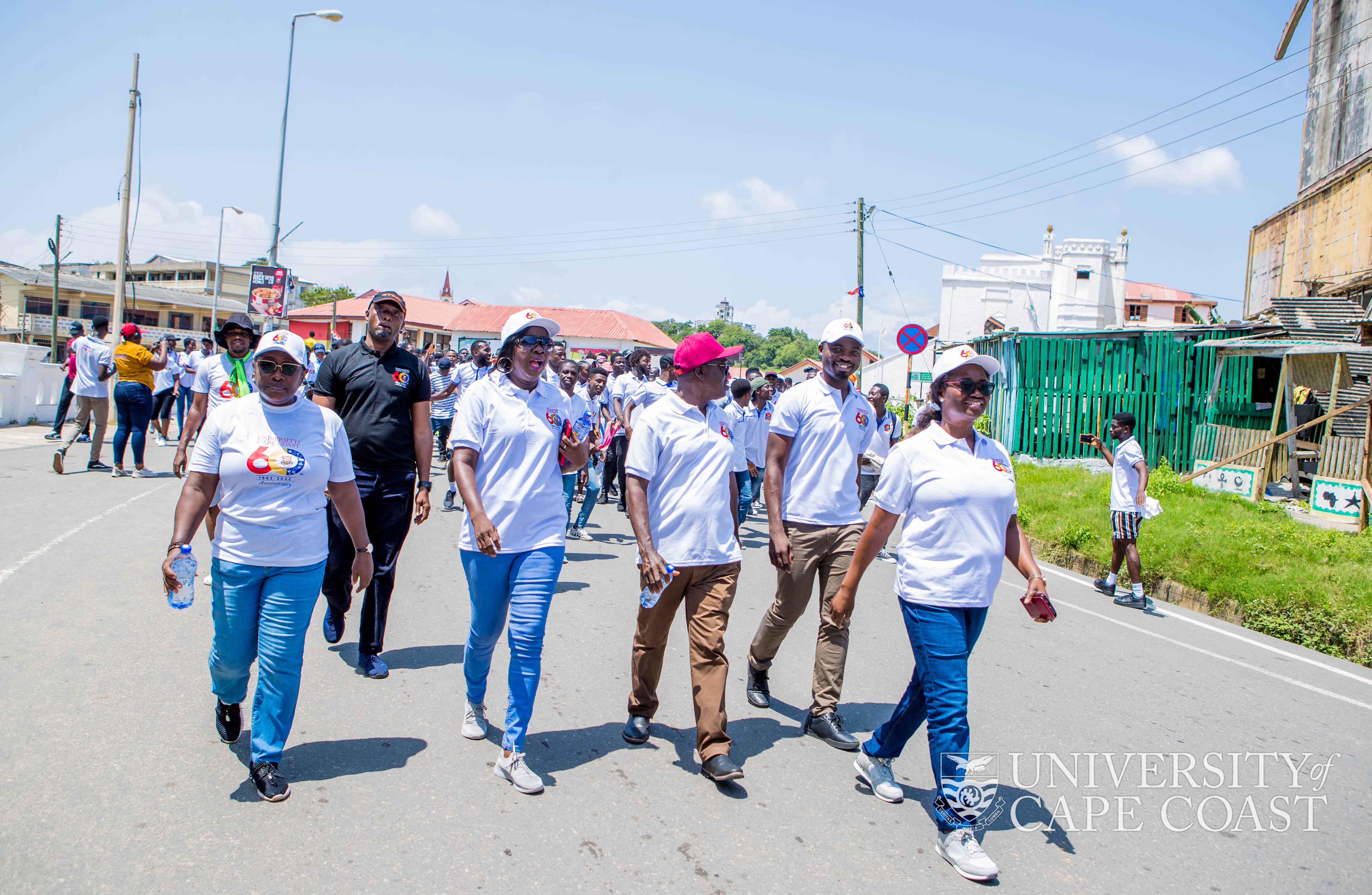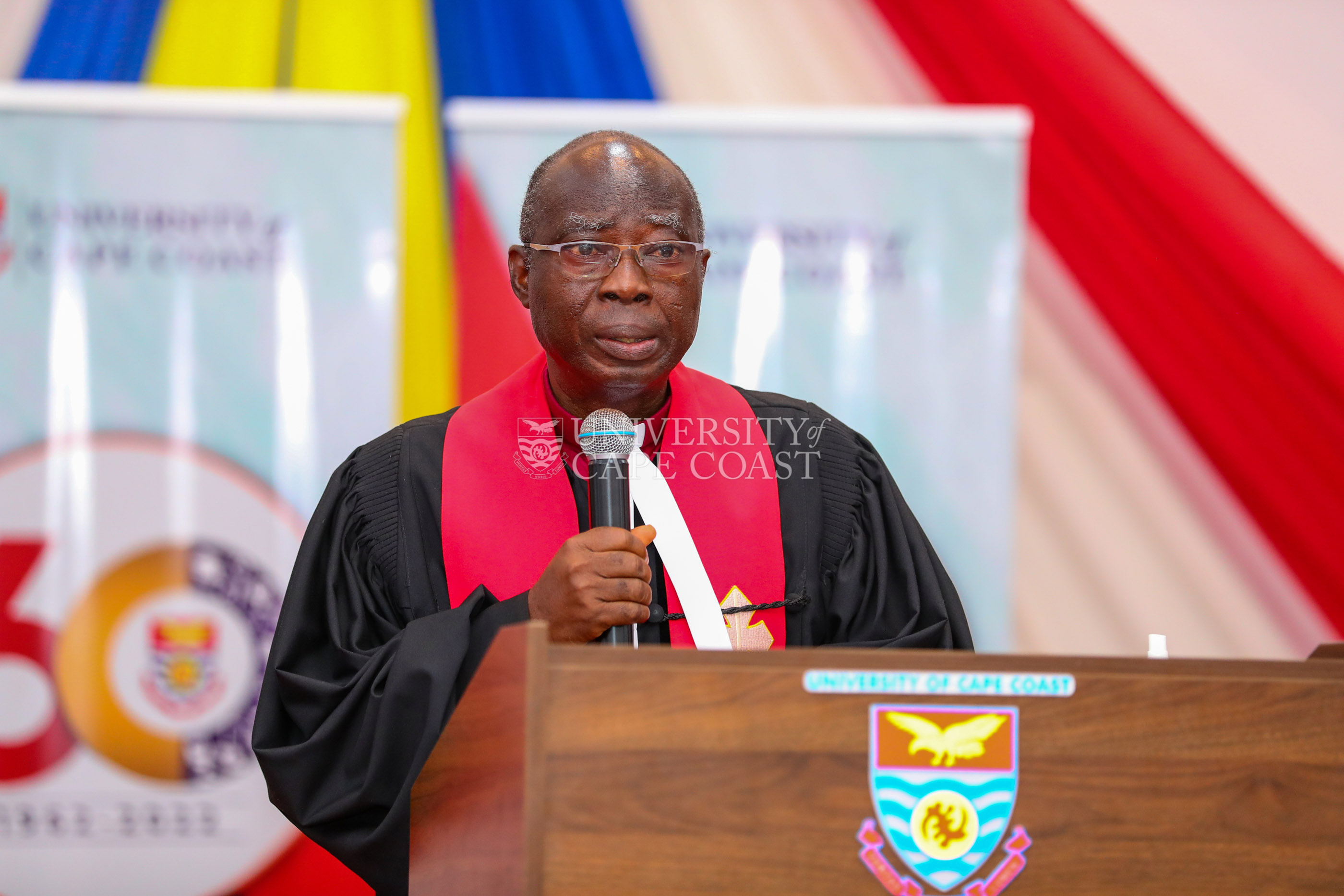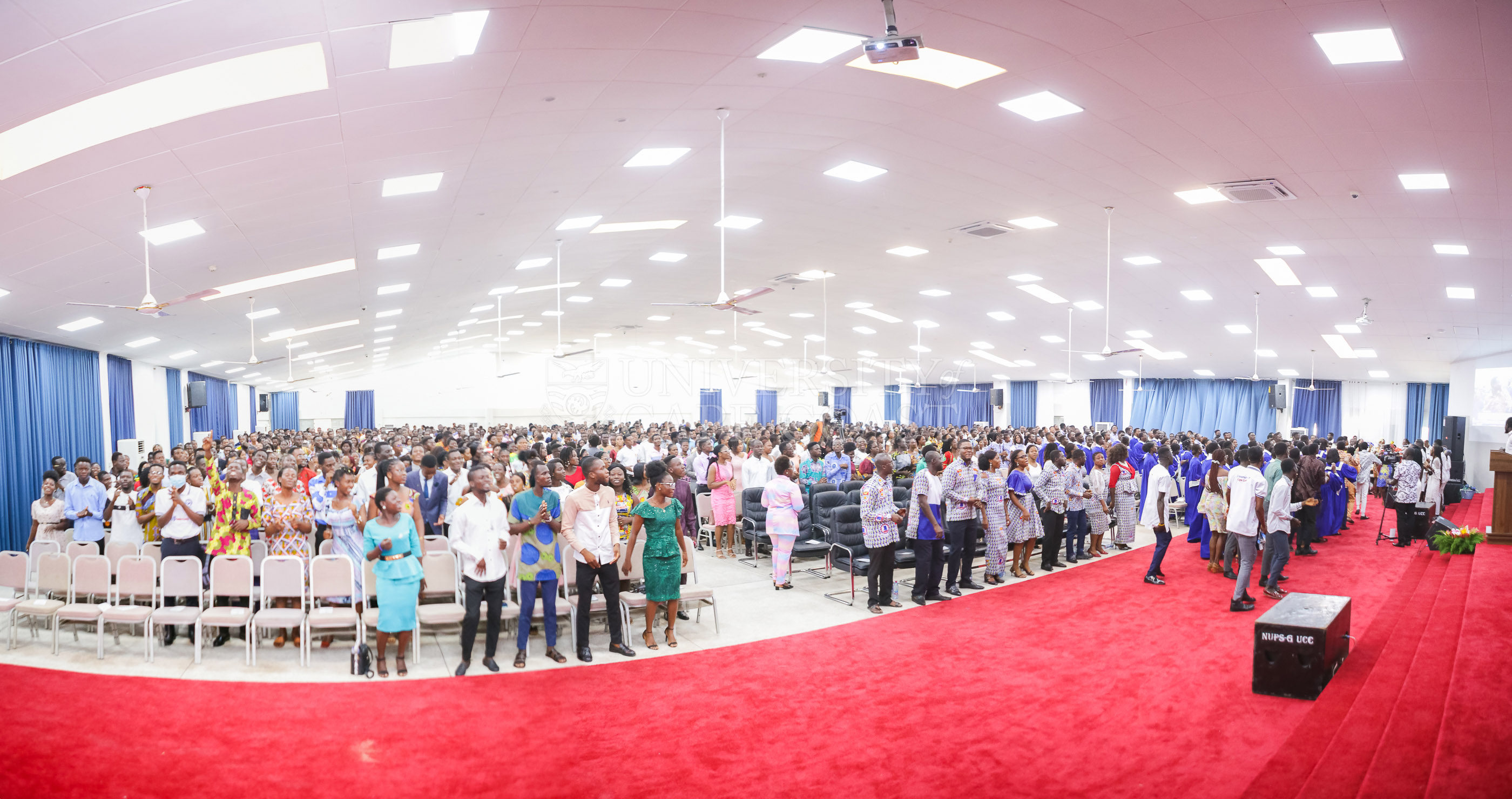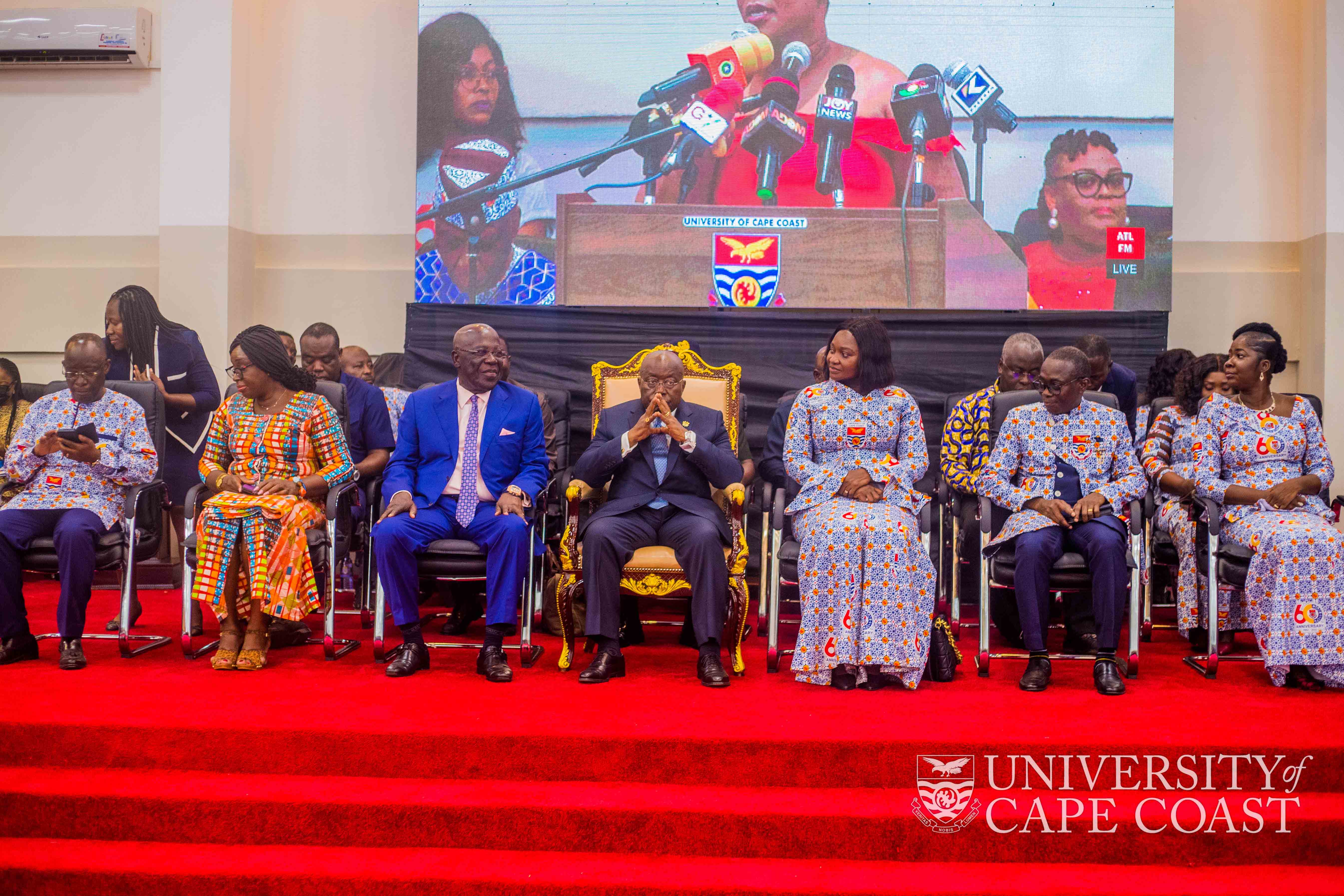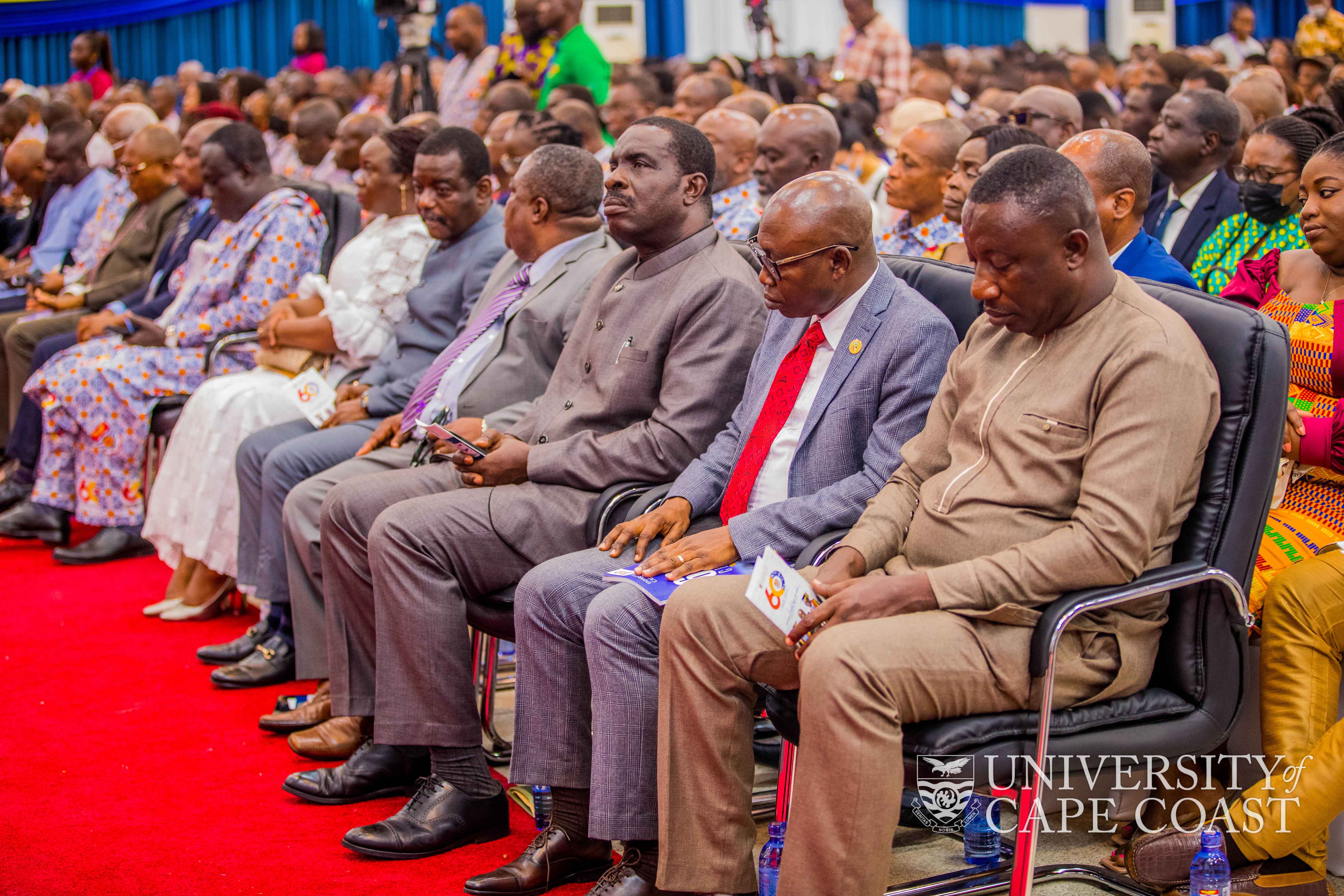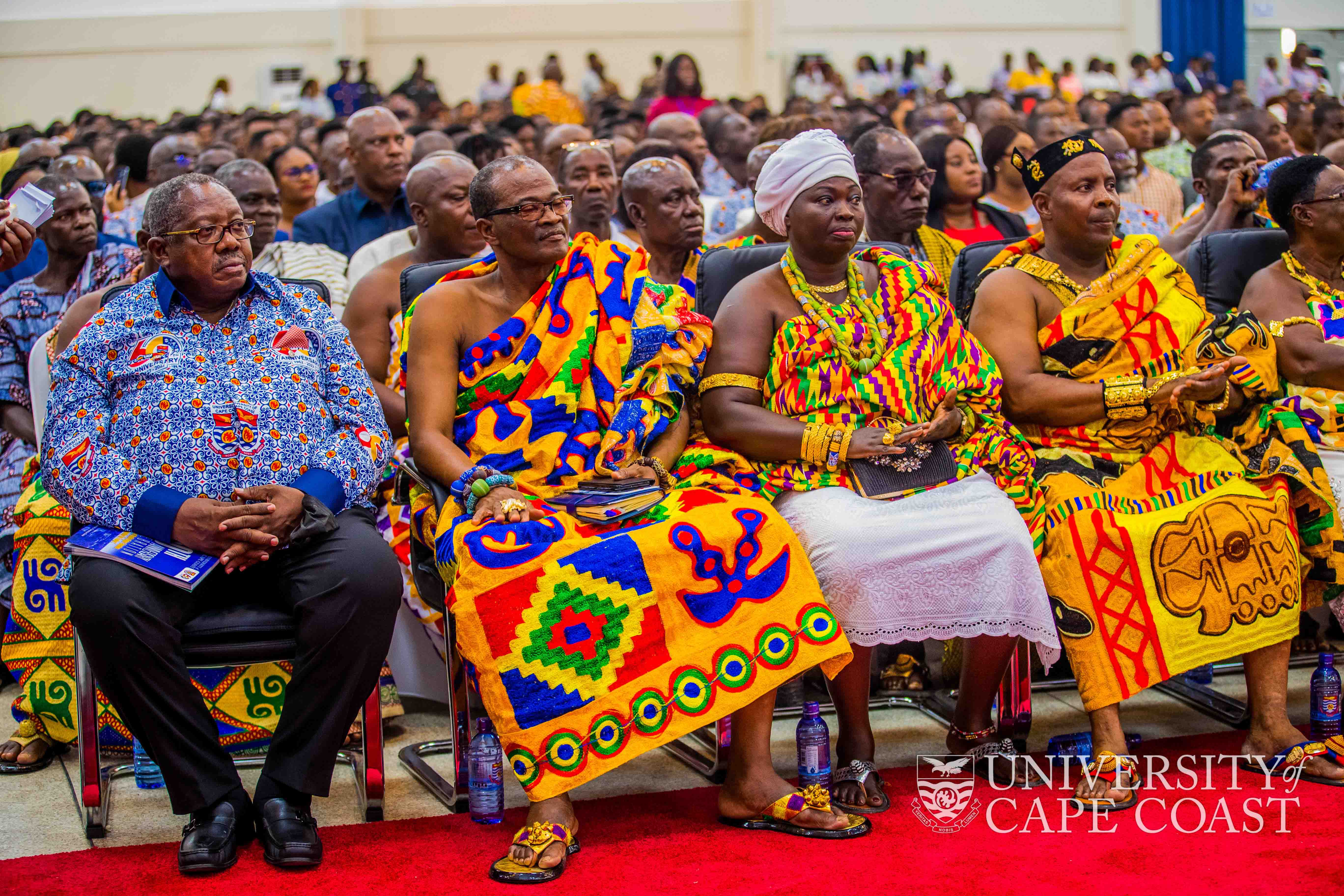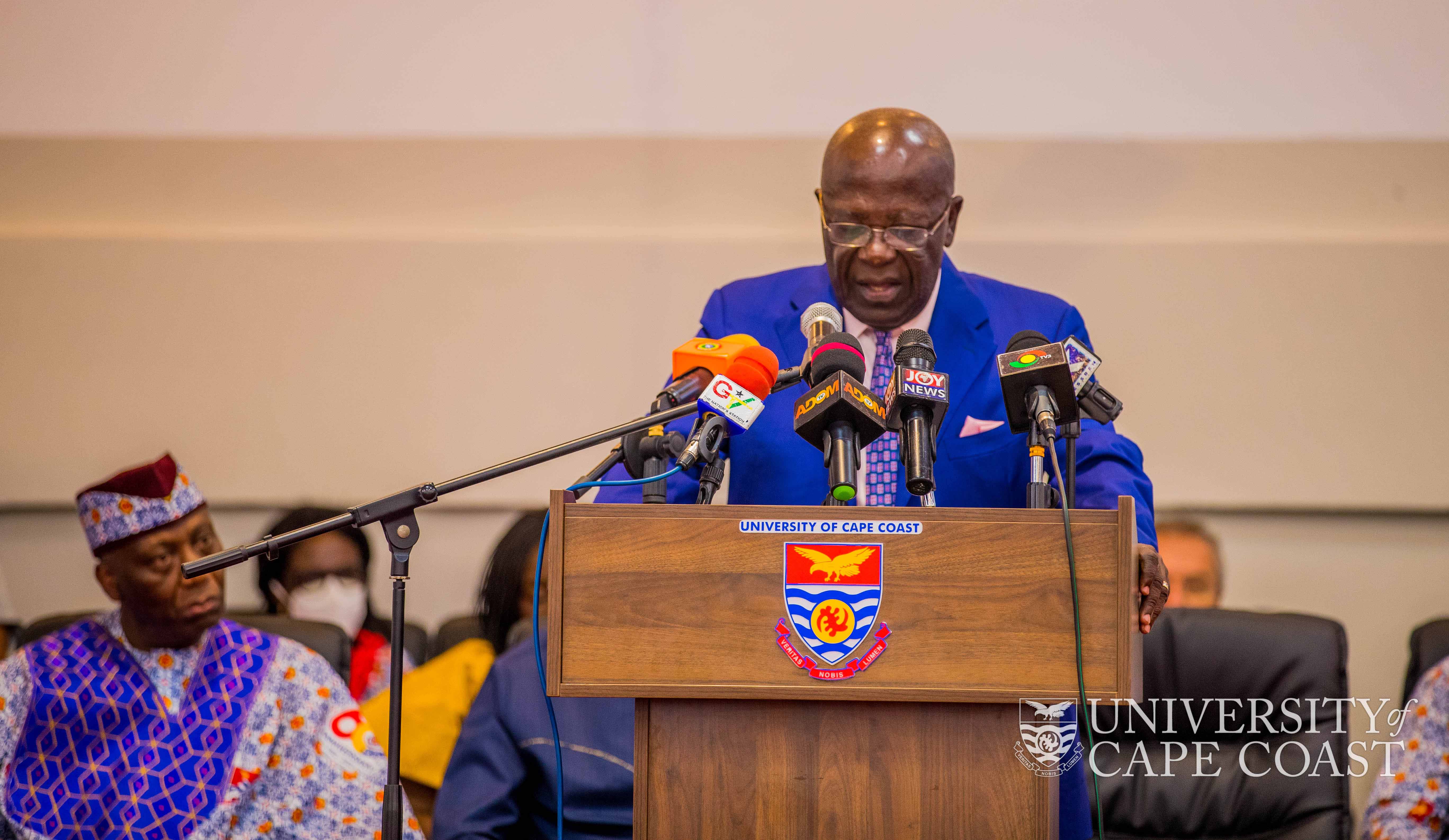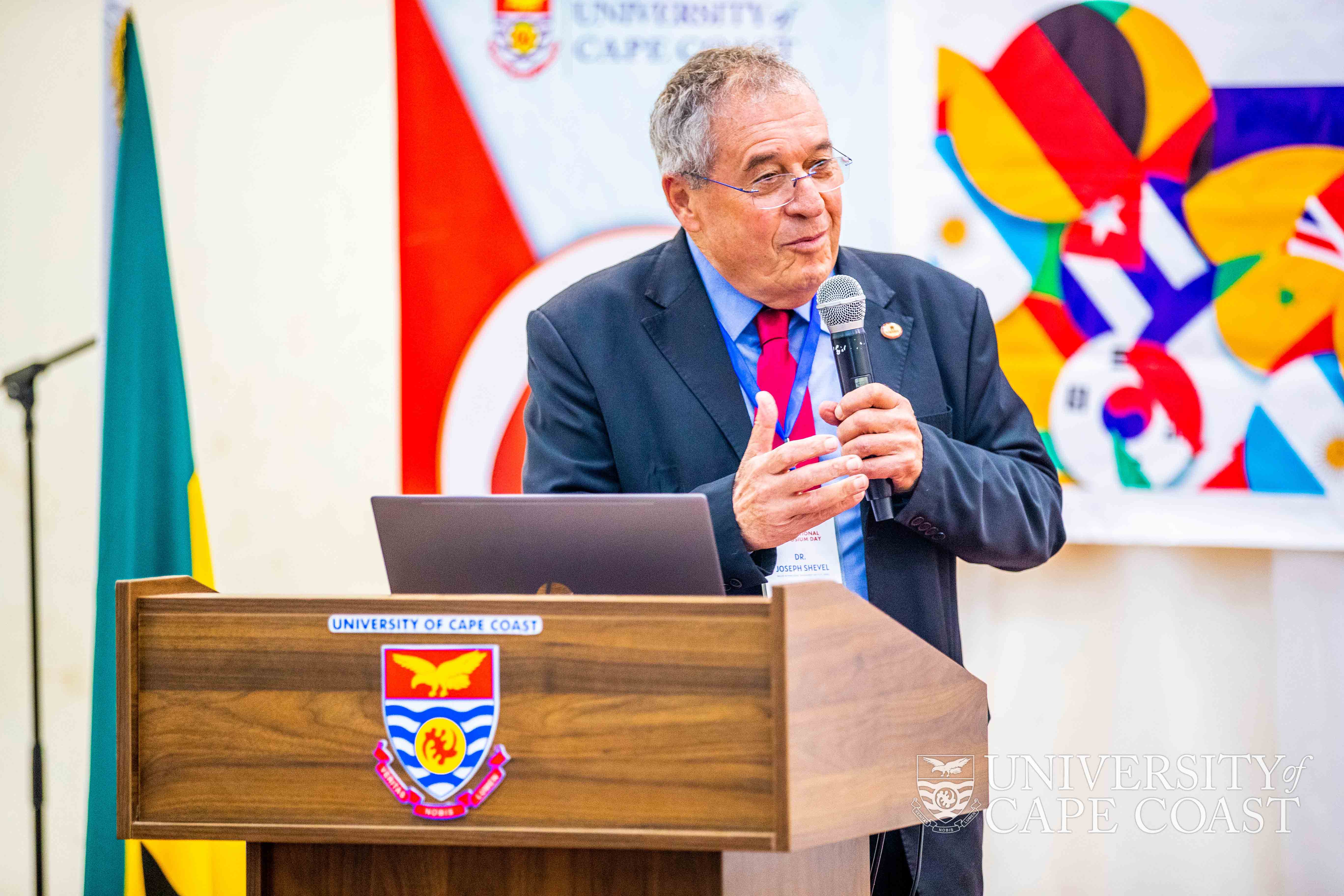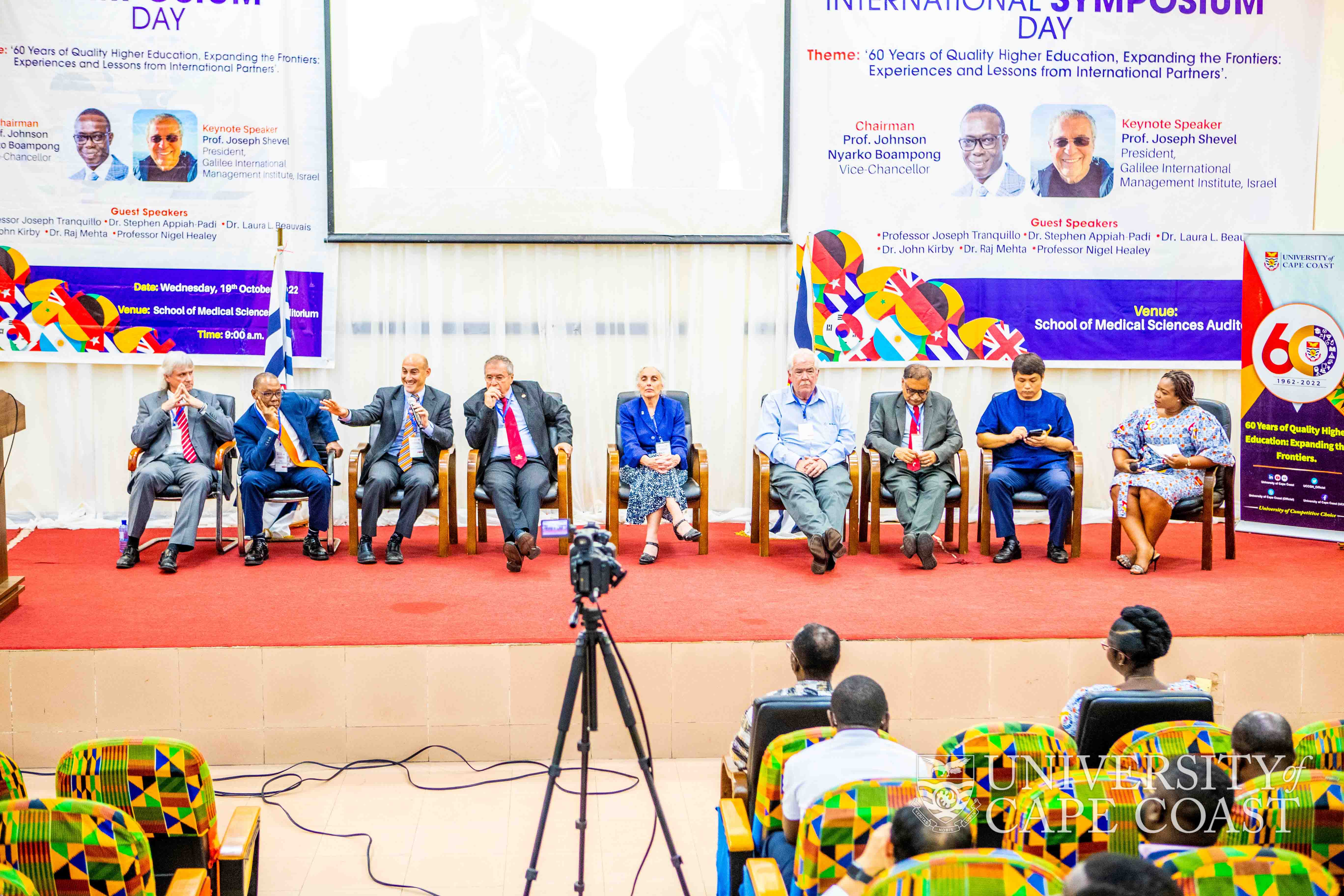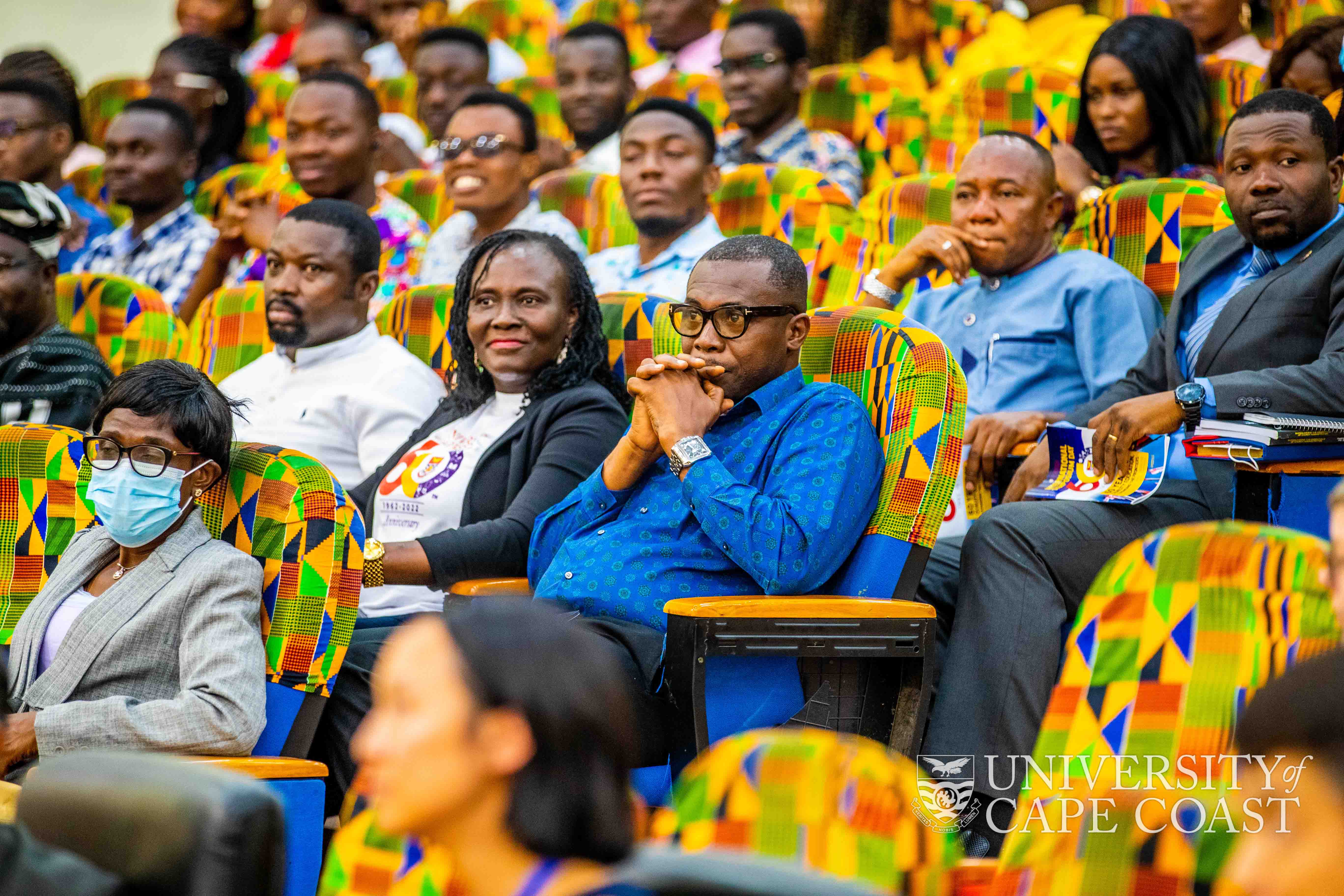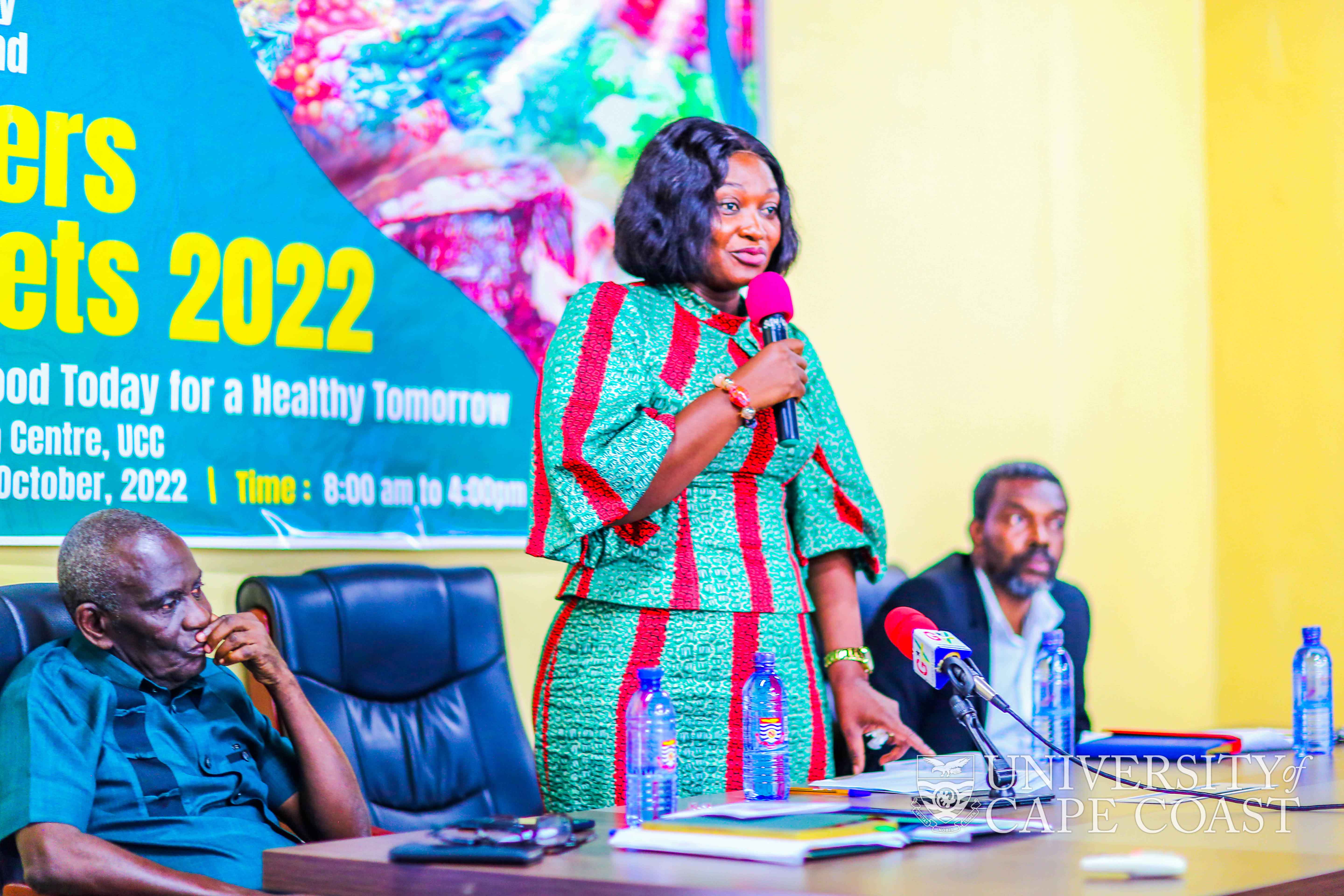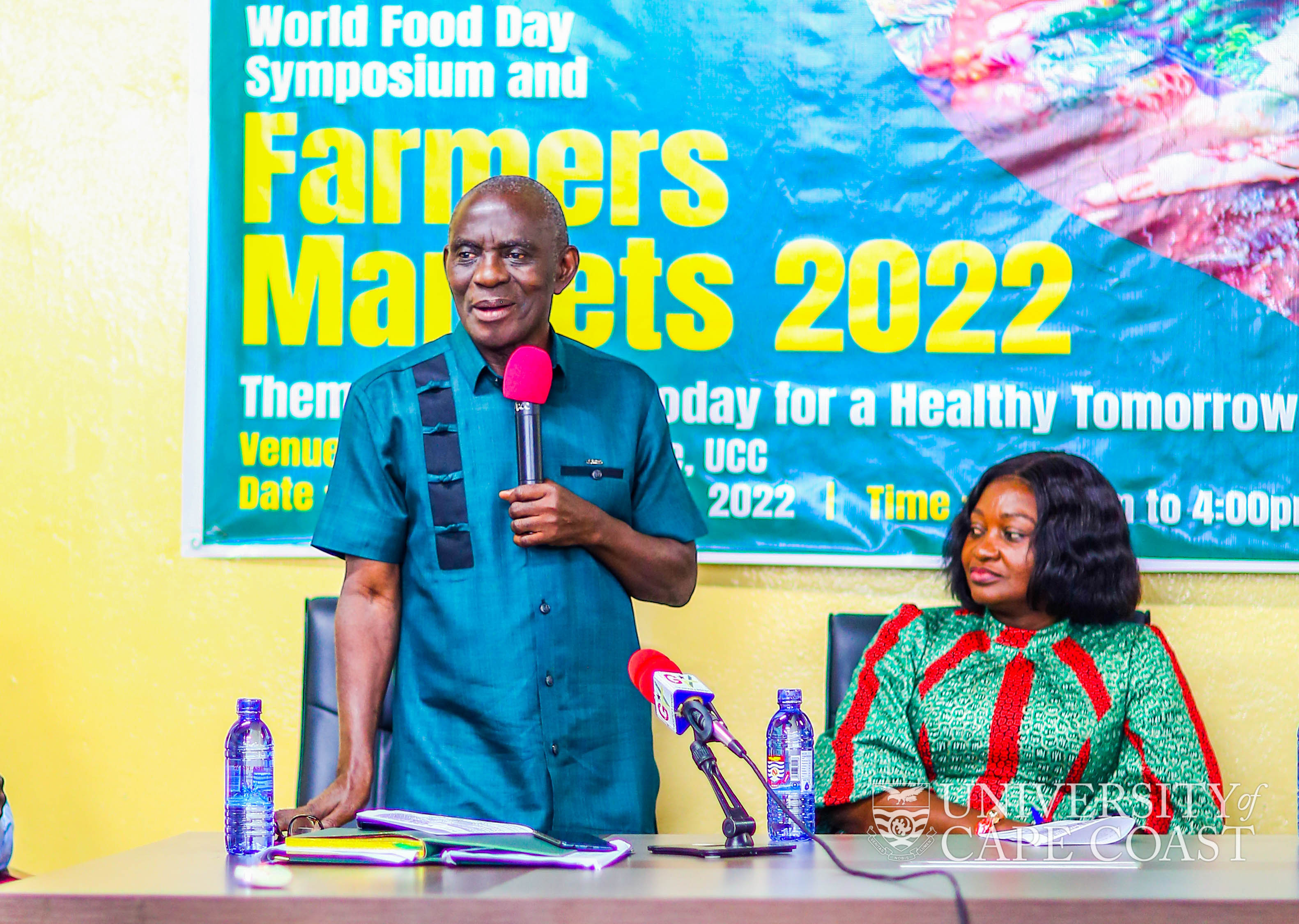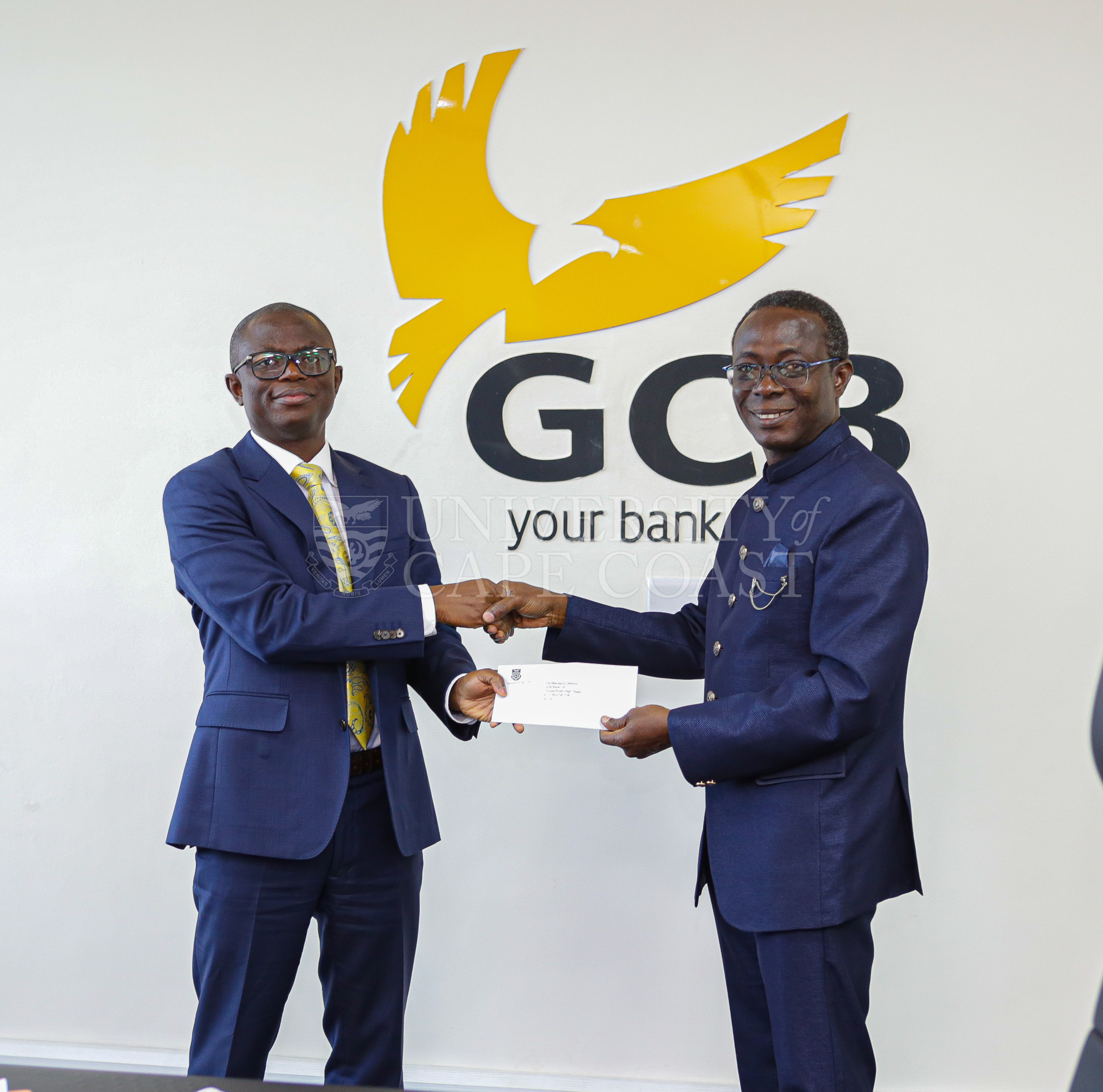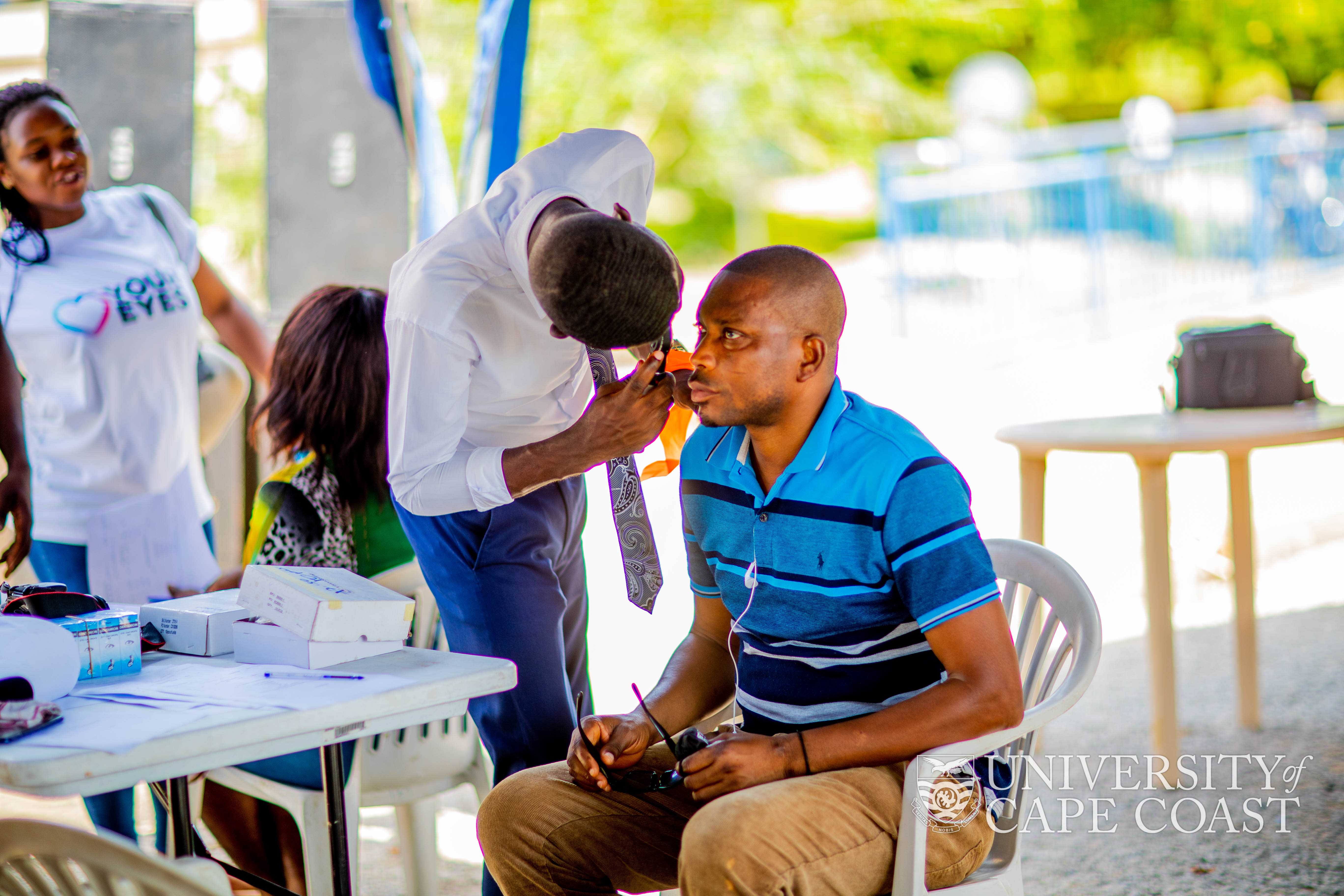
Management, staff and students of University of Cape Coast (UCC) defied the scorching sun to embark on a three-hour mega street float as part of the 60th anniversary celebration of the University.
Clad in UCC@60 paraphernalia and accompanied by loud music blasting through speakers mounted on fully-loaded UCC@60 branded articulated trucks as well as brass band music, the mammoth crowd began the float from Victoria Park in the central business district of Cape Coast through some principal streets and ended at the Club House of the University.
Pro Vice-Chancellor, Prof Rosemond Boohene (2nd left) leading the float
The Pro Vice-Chancellor, Prof. Mrs. Rosemond Boohene, who led the float, thanked the Almighty God for guiding them through the exercise and expressed her gratitude to the participants for the remarkable turn out.
The Pro Vice-Chancellor hailed participants, especially students, for the level of comportment during the float, saying the security personnel also deserved commendation for keeping all in line.
Participants in the float were excited about the event and lauded the UCC@60 Planning Committee for a wonderful work done.
In attendance during the float included the Registrar, Mr. Jeff Teye Onyame, Provosts and some Directors.
Source: Documentation and Information Section-UCC

The Cape Coast branch of Zenith Bank, has presented a cheque for GHS 50,000 to the University of Cape Coast (UCC).
The gesture was to support activities earmarked for the 60th anniversary of the University.
Presenting the Cheque to the Chairman of the UCC at 60 Planning Committee, Prof. Livingstone K. Sam Amoah, the UCC Branch Manager of the Bank, Mr. Ernest Mintah, said the Bank was justly proud to be associated with UCC for the past thirteen (13) years.
"This is a token from the Bank to wish UCC happy 60th anniversary. Congratulations, UCC!" he added.
He said the Bank cherished its long-standing relationship with UCC.
Receiving the cheque, Prof Sam Amoah expressed gratitude to Zenith Bank for the kind gesture.
The Secretary to the Committee, Mr. Nasir Yaqub Entsie, attended the presentation.
From Zenith Bank, the Head of Marketing, Mrs Agartha Quayson and the Head of Operation, Mr. Benjamin Kofi Donkor, were present at the meeting.
Source: Documentation and Information Section-UCC

The University of Cape Coast (UCC) has held a non-denominational thanksgiving service to show gratitude to God as management, staff and students round off the 60th Anniversary celebration of the University.
With attendees mostly clad in tailored white attire, the thanksgiving event was on the theme, "Our Strength is from God."
Amidst songs of praise and dance, the celebrants demonstrated their appreciation to God for His unmerited favours for a successful anniversary.
During the service, Very Rev. Prof David Duodu led the congregation to offer prayers for the University community, as well as the leadership of Ghana.
Rev. Dr. Joseph Apea Asamoah
Delivering the anniversary sermon, the Chairperson of the Western Presbytery of the Presbyterian Church of Ghana (PCG), Rev. Dr. Joseph Apea Asamoah, entreated the congregants to help clear up ignorance and misconceptions bedeviling the masses though he admitted it would be an uphill task to help people out of their ignorance.
However, Rev. Dr. Asamoah noted, “The Lord is ever ready to give us the strength we need to succeed in this task.”
The congregation at the service
Rev. Dr. Asamoah, who has served the Presbyterian Church for the past thirty-two (32) years, said the mercies of God were the source of mankind’s strength to discharge the task.
"They are always available for those who are willing to do the works of God. For the Lord our God is the fountain of mercy" the Preacher added.
In next the next forty (40) years, he challenged UCC to reach out to citizenry who will bring people out of ignorance and misconception.
Rev. Dr. Asamoah also expressed disgust about the continuous destruction of the country’s forest reserves and water resources through activities of illegal miners (galamsey).
The Pro Vice-Chancellor, Prof Rosemond Boohene, in a short address, entreated members of the University community to be thankful and appreciate God for a successful anniversary. She noted that the act of thanksgiving grew the faith of Christians.
Prof. Boohene praised staff and students for their hard work towards the growth of UCC.
Source: Documentation and Information Section-UCC

President Nana Addo Dankwa Akufo-Addo has reiterated the commitment of his government to expand infrastructure at University of Cape Coast (UCC) to absorb the teeming Free Senior High School graduates’ access to university education.
“Indeed, I assure you of the commitment of my government to give the University the required support to expand its infrastructure for the benefit of the numerous senior high school graduates who now qualify to access university education” he said.
The President was speaking at the grand durbar climaxing the 60th anniversary celebration of UCC.
He expressed gratitude to UCC for acknowledging the benefits of the Free Senior High School intervention since its inception in 2017.
The President with some dignitaries at the UCC@60 grand durbar
Despite the harsh economic conditions currently facing the country, he observed that government would not renege on its commitment to provide quality education and equal opportunities for future generations to access good education.
“Regardless of the difficulties currently confronting our nation, government will continue to intervene and remain responsible for the provision of free and quality basic and secondary education for all”, President Akufo-Addo added, insisting: “Education is the equalizer of opportunities”.
Whilst finding solutions to complex and far reaching problems across borders and disciplines, the President charged the University to remain “pure and unadulterated in the provision of quality academic and intellectual discourse”.
He expressed joy at the number of products from UCC occupying enviable positions in the country, especially in public universities.
A section of some dignitaries at the grand durbar
He, therefore, seized the chance to pay glowing tribute to the founders, management, lecturers and students of UCC for their resolve, hard work and commitment to duty which had led the University to chalk up successes.
President Akufo-Addo lauded the Vice-Chancellor, Prof. Johnson Nyarko Boampong, for his vision to produce graduates with entrepreneurial mindsets and assured the Vice-Chancellor that government would support him to realise his lofty entrepreneurial vision for the University.
Former Chairman of UCC Council, Nana Sam Brew Butler and some traditional rulers
The President, therefore, urged traditional authorities in Cape Coast to join forces with government to stop all encroachment on UCC lands.
UCC urged to Champion Agenda “Grow What We Eat”
The Chancellor of UCC, Dr. (Sir) Sam Esson Jonah, has charged the School of Agriculture of the University to take the lead in providing better yielding crop varieties in ensuring increase in crop production.
“We are entrusting this school with the responsibility of ensuring that we grow what we eat and to a large extent eat what we grow. I expect you to establish a faculty that is capable of forming strong partnerships, bonds and collaborations with institutions and other relevant local bodies, pertinent to the development of our agricultural sector”, he said.
UCC Chancellor, Dr. (Sir) Sam Esson Jonah
The Vice-Chancellor, Prof. Johnson Nyarko Boampong, for his part, promised to ensure that the University chalked up many academic successes during his tenure.
To achieve that, he appealed to government to consider giving financial clearance for the recruitment of staff for the University to reduce the workload of teaching staff.
He attributed the accomplishments of the University to all the stakeholders and founding fathers of the University.
President Nana Akuo-Addo commissioning one of the new facilities
The durbar, held at the New Examination Centre, attracted high profile personalities, including politicians, academics, traditional authorities amongst others.
Source: Documentation and Information Section-UCC

The University of Cape Coast (UCC has held an International Symposium as part of activities heralding the peak of the 60th anniversary celebration of the University,
On the theme, “60 Years of Quality Education, Expanding the Frontiers: Experiences and Lessons from International Partners”, the event was organized by the Office of the International Relations of UCC.
The President of Galilee International Management Institute (GIMI) in Israel, Dr. Joseph Shevel, speaking as the keynoter at the event, indicated that education was the bedrock of the development of every country and urged Ghana to increase education and investment to unlock the potentials of its youth.
President of Galilee International Management Institute (GIMI) in Israel, Dr. Joseph Shevel
Consequently, he stated that quality education was the bedrock for achieving sustainable and inclusive development and its impact on improving all sectors of the economy could not be underestimated.
Dr. Shevel, who spoke on the theme, “Emerging higher education frontiers experiences from Israel; lessons for African education” attributed Israel’s high investment in education and training to its economic successes and challenged Ghanaian universities to take a leaf out of Israeli universities.
The President of GIMI said Israel was the number one in the world in research and development, saying Israel had the biggest share in the technology industry with sixty-three (63) different companies through education.
He claimed that Israel was the only nation in the Middle East with no water, mineral resources or oil, but had made remarkable strides on the continent as a result of the importance attached to education.
The keynoter and other speakers during a discussion session at the symposium
Touching on agriculture, he predicted that Ghana’s water bodies could be adversely affected by global warming and called on the leadership of the country to take immediate steps to forestall any calamity.
In the midst of abundant rainfall and water bodies, he expressed shocked that only a paltry 50 per cent of Ghana’s population was into agriculture, the mainstay of the Ghanaian economy, but contributing only 20 per cent to the GDP.
Vice-Chancellor, Prof. Johnson Nyarko Boampong
He said it was through such international partnerships that culminated into UCC becoming the first University in Ghana, West Africa and fourth in Africa.
“So indeed, working closely with our strategic partners, has helped the University of Cape Coast to become the number one University not only in Ghana and in West Africa, but the 4th on the continent. In terms of our research influence, we are at the 24th position; at least we are making progress” the Vice-Chancellor added.
Some participants in the Symposium
Present at the symposium were delegations from the Bucknell University, University of Cincinnati, University of Rhode Island, University of Limerick, Millersville, and International Fellowship of Korea.
The delegations, in turn, shared their best practices with UCC, as well as ways UCC could adopt to remain competitive in the world.
Source: Documentation and Information Section-UCC

The School of Agriculture, University of Cape Coast (UCC) has joined the rest of the world to celebrate this year's World Food Day with a Farmers’ Market event.
This year's global theme for the celebration was "Safe Food Today for a Healthy Tomorrow."
Locally, the School marked the Day on the theme, “Leave no one behind" and it aimed at making food systems more resilient to withstand global volatility and deliver affordable and sustainable diets for all.
The Day is celebrated widely by many organizations concerned with food security, including the World Food Programme, Food and Agriculture Organization and the International Fund for Agricultural Development.
Hon. Central Regional Minister, Mrs. Justina Marigold Assan
"That notwithstanding", she pointed out, “it was the collective responsibility of every Ghanaian to ensure that food safety was maintained at a standard that would improve the quality of the lives of our people."
Mrs. Assan expressed gratitude to the Korea International Cooperation Agency (KOICA) for supporting the School of Agriculture. She said KOICA had also expressed its readiness to support Districts in the region to produce “Central Rice" in large quantities.
"When we talk about ‘Central Rice’, it is rice KOICA is supporting our local farmers to produce, well labeled with delicious taste" she added, "Very soon if you want to go into rice production, you need to come to Central Region for your quality rice seed."
The keynote Speaker, a former Member of Parliament for Twifo Atti-Morkwa Constituency, Mr. Abraham Dwuma Odum, called on Ghanaians to patronize local dishes derived from crops grown in Ghana to provide the much needed markets to farmers to ensure food security.
Mr. Abraham Dwuma Odum (speaking)
Mr. Odum, therefore, appealed to people to consume locally produced nutritious foods to avoid diseases associated with foreign processed food products.
He noted that Central Region had the capacity to produce rice for the country.
He said the Planting for Food and Jobs policy was very good; however, its design and execution had had a toll on its implementation.
Some patrons at a stand during the Farmers’ Market event
He said food businesses should comply with international food standards and engage employees, suppliers and other stakeholders to grow and develop a food safety culture.
The Symposium was chaired by the Dean of the School of Agriculture, Prof. Henry De-Graft Acquah.
As part of the event, a Farmers’ Market was held where patrons had the chance to purchase fresh produce.
Source: Documentation and Information Section-UCC

VC-UCC, Prof. Nyarko Boampong (right) presenting a UCC@60 grand durbar invitation to GCB Bank PLC
Source: Documentation and Information Section-UCC

The Optometry Students’ Association of Ghana (OSAG) of University of Cape Coast (UCC) has marked the 2022 World Sight Day with a free eye screening exercise for students and the general public.
Globally, this year's event was on the theme: “Love Your Eyes".
A student getting his eyes tested
The exercise was used to provide free medication and eye glasses to those with mild conditions, while those with serious conditions were referred to the UCC Eye Clinic for further treatment.
World Sight Day is observed on every second Thursday of October every year to focus attention on vision impairment and blindness to influence decisions of governments, policy makers and other stakeholders.
Source: Documentation and Information Section-UCC

The University of Cape Coast, UCC, has been ranked first university in Ghana, and West Africa, and fourth in Africa, according to the 2023 Times Higher Education Rankings.
The 2023 Times Higher ranking also placed UCC 24th on universities globally for research influence, as well as amongst top 400 globally.
In 2022 ranking, UCC was adjudged the best university in Ghana, in West Africa, the 4th best university in Africa and the best university globally for research influence.
The annual Times Higher Education (THE) World University Rankings (WUR) is the most prestigious global ranking. It aims to provide the definitive list of the best universities evaluated across five (5) key areas of Teaching, Research, Citations, International Outlook and Industry Income.
It is also the only global university rankings league table to judge research intensive universities across each one of their core missions: Teaching (the learning environment), Research (volume, income, and reputation) International outlook (staff, students and research) Citations (research influence) and Industry Income (knowledge transfer).
Times Higher Education (THE) uses carefully calibrated performance indicators to provide the most comprehensive and balanced comparisons, and all data are independently audited by professional services firm PricewaterhouseCoppers (PwC), making the Times Higher Education World University Rankings the only Global university rankings, which is subject to full independent scrutiny.
Source: Documentation and Information Section - UCC


